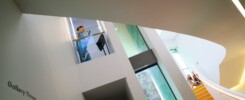In the back of beyond, where cheeky Wekas say good night, we stayed at a small campsite. After we put up our tent, the host came by to register our names. We told her about our project and our travels, when she suddenly burst out: “Wait a moment, what was your name again? – No, I can’t believe that. You have been on the radio a few days ago! I have to tell my husband. He won’t believe, who is staying with us tonight!”
What an experience: having given my first radio interview ever live on air just a week ago, now somebody I never met before recognises me! I feel like a real star. Said interview – I had a lovely talk with Bryan Crump at Radio New Zealand in Wellington – was organised by the Auckland Arts Festival, where I would play two concerts mid-March. You can read the story and listen to the talk here. After the interview, we treated ourselves to some ice-cream and a visit to Te Papa museum, then we headed home. At that point, home was the orchard of Roger and Brenda in Manakau about an hour north of Wellington, where we stayed in exchange of helping them pruning, weeding, and mowing in their garden. We were missing our Austrian garden so much that we decided to take a break from exploring and settle down for a week. The physical labour also helped us reflect on our experiences so far. Furthermore, it was the conclusion of our time on the North Island before we boarded the ferry to cross Cook Straight to Picton and set foot on the New Zealand’s South Island.
Soaring mountains, vast meandering rivers, empty wilderness beaches, majestic glaciers, turquoise lakes, and sandflies – the South Island has it all. We travelled with our rental car and camped in our tent for the next two weeks to take a glimpse into New Zealand’s nature gems. And I have to say the hype is real. No matter if you go to the famous National parks such as Abel Tasman, Aoraki/Mount Cook, or Mount Aspiring, or if you do the numerous scenic drives, you will be left awestruck by nature’s beauty. My personal highlight was Milford Sound. We didn’t book a cruise, however, we played our dices well and arrived at Milford Sound when the last boat had already come back. The busloads of tourists had already left, so we had the end of the world completely to ourselves. I took this once-in-a lifetime chance and played on my bass clarinet at that magical place.
After so many memorable experiences, one of the best things was still yet to come. In Christchurch, the “Portal” team met in real life for the first time. Reuben had made great efforts beforehand organising a masterclass at Christchurch university for me, as well as concerts at the Arts Festival in Christchurch and the Auckland Arts Festival. Moreover, he connected me with New Zealand composer Dylan Lardelli and taonga puoro practitioner Ariana Tikao. Since I learned about this collaboration, I was very excited to play and improvise with Ariana. Also, I was looking forward to meeting Dylan and Reuben and rehearsing their freshly written solo pieces. These days were pretty intense, as I had had little to no chance to practise the previous weeks while camping. It feels somehow weird to roar into my instrument amidst tents and campervans. So, I got the bill now: cut my lip open with the wooden reed with no chance of letting it rest to heal. The show must go on.
The best part, however, was to have the privilege to be invited to Rapaki Marae and spend a night there. A marae is a Māori meeting place and tapu (sacred). You are welcomed into a marae with a pōwhiri, a ceremony where hosts and visitors speak about their history as well as their intentions and both groups share a waiata (song). In our case Ariana performed the karanga (call) in the beginning, Reuben was our speaker, and Sebastian and I performed an Austrian yodel in the end. Concluding, everyone is exchanging hongi (touching noses) and sharing breath by doing so. The ceremonial tapu is lifted with having food together. It was by far the most special and also a very intimate experience. After being welcomed into the marae, Ariana held a workshop about her taonga puoro for her community and in the end, the two of us performed her piece “Te Hurika” together. It was a spontaneous pre-premiere, but playing with her and merging the sounds of our instruments in this special place was an amazing experience for me. Our time in the marae really let the whole portal group come closer together and was the perfect preparation for the following concert in Christchurch.
The Arts Festival completely trusted our concept, so we included the audience and had them play a forest of cicadas as well as the interludes between the pieces. Our time in Christchurch went by way to quickly, but the farewell was not for long, as we were going to see each other again in Auckland a few days later.










































